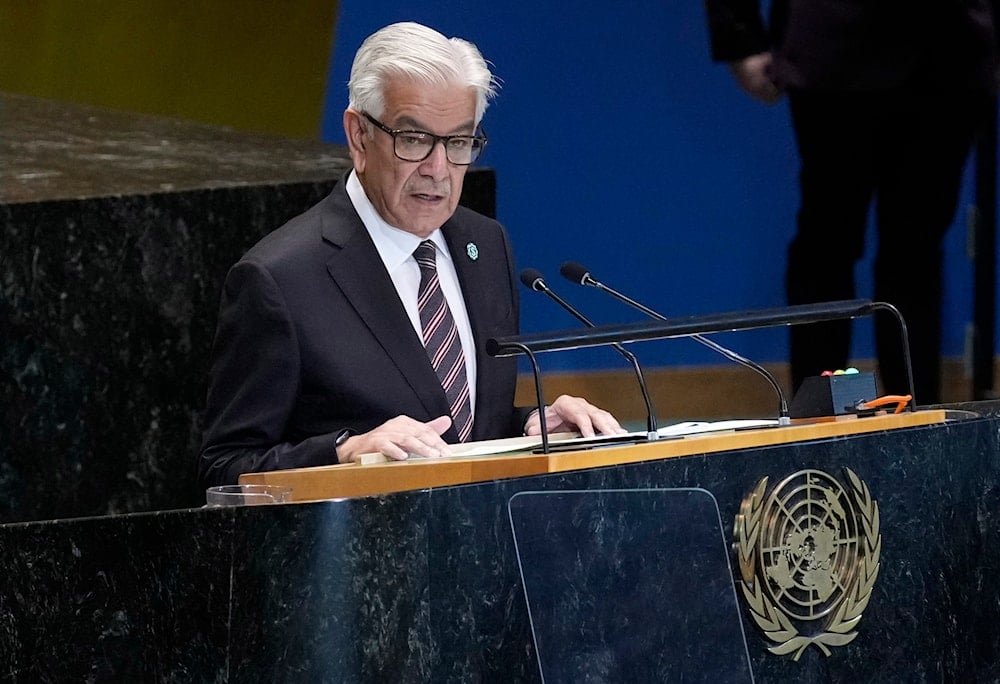Ceasefire with Afghanistan hinges on Afghan attacks: Pakistan
Pakistan’s Defense Minister says the Pakistan-Afghanistan ceasefire will hold only if attacks from Afghan territory stop, following failed Istanbul talks over cross-border terrorism and Taliban-related concerns.
-

Pakistan's Defense Minister Khawaja Muhammad Asif addresses the Summit of the Future, in the United Nations General Assembly, Monday, Sept. 23, 2024 (AP)
Pakistan’s Defense Minister Khawaja Muhammad Asif said the ceasefire with Afghanistan will hold if no attacks come from Afghan territory, as Reuters reported that Istanbul talks collapsed over truce and counterterrorism disputes.
Pakistani Foreign Ministry spokesperson, Ambassador Tahir Hussain Andrabi, explained that during the Istanbul talks, the Pakistani delegation presented evidence-backed demands to the mediators aimed at ending what it described as “cross-border terrorism”.
He noted that the mediators “support Pakistan’s position and are discussing it with the Afghan Taliban delegation point by point,” without issuing any final statement on the outcome of the current round of talks.
Andrabi added that the ceasefire was the central focus of the third round of negotiations held in Istanbul, Turkey, emphasizing that the previous truce agreement remains in place while the details of its implementation continue to be discussed at the senior official level.
No ISIS elements in Pakistan
The spokesperson also denied the presence of ISIS elements in Pakistani territory, dismissing claims from the Afghan side as false and stressing that Pakistan itself is a victim of terrorism, while describing the Afghan government’s statements on the issue as inaccurate.
This round of talks follows two previous meetings held in October, during which the Doha ceasefire agreement was extended amid mutual accusations between the two countries over support for armed groups, with Islamabad accusing the Afghan government of providing safe haven to the Pakistani Taliban and preventing action against attacks on Pakistani soil.
Talks between Afghanistan and Pakistan began in the Qatari capital of Doha, where the two sides agreed to an immediate ceasefire after a week of severe border clashes. The truce, announced on October 19, 2025, was brokered by mediators from Turkey and Qatar and was intended to halt hostilities while detailed negotiations could proceed.
Shaky ceasefire talks
Following the agreement in Doha, a follow-up round of talks was held in Istanbul. These discussions focused on implementation of the truce and mechanisms to prevent cross-border attacks. However, the Istanbul round ended without a resolution as each side pledged but failed to address key issues such as militant safe havens and responsibilities for violence.
The core sticking point has been Pakistan’s demand that militants operating from Afghan territory must be restrained, while Afghanistan’s delegation acknowledged limits to their control over some armed groups. Pakistan alleged that the Tehrik-e-Taliban Pakistan (TTP) enjoyed de facto freedom inside Afghan territory, and insisted that the ceasefire was conditional on eliminating such cross-border threats.
Despite the failure of the Istanbul talks, the ceasefire agreement remains formally in place, offering a window of relative calm. Nevertheless, new clashes, including exchanges of fire that killed civilians, have threatened to undermine the fragile truce and underscore the volatility of the situation.

 3 Min Read
3 Min Read









